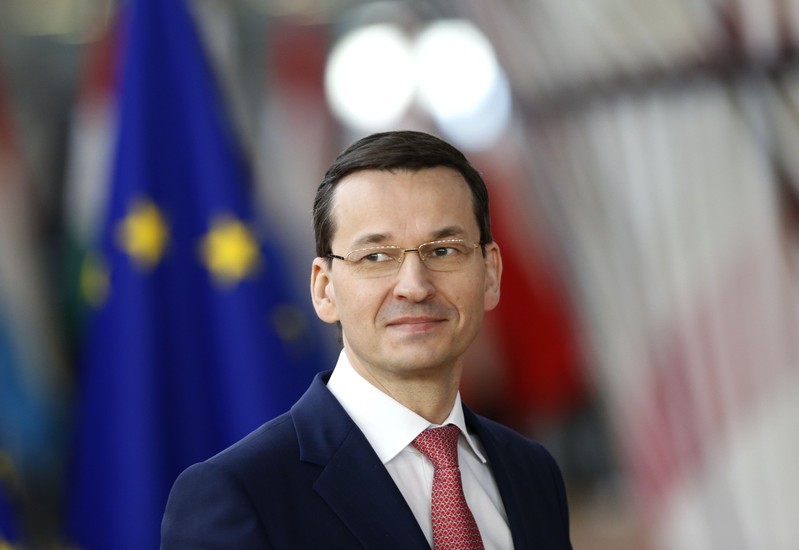
Poland’s Prime Minister Mateusz Morawiecki arrives at a European Union leaders summit in Brussels, Belgium, March 22, 2018. REUTERS/Francois Lenoir
April 11, 2018
By Gabriela Baczynska and Alastair Macdonald
BRUSSELS (Reuters) – The European Union’s executive on Wednesday said it hoped for a deal “very soon” in a fundamental dispute with Poland over judicial independence and sources said mid-May could be a key date.
After two years of standoff between the bloc’s largest ex-communist member and the more liberal founding states, Poland’s ruling nationalists brought in a new prime minister at the turn of the year to seek a thaw with Brussels.
The EU now sees Poland, where the ruling Law and Justice (PiS) party stands accused of imposing more direct government control on the judiciary, as a test case for the bloc.
Warsaw also stands to lose because some EU members, taken aback by the PiS moves, have pushed to make access to future EU funding conditional on respecting democratic values such as the rule of law and judicial independence.
Poland is currently the biggest beneficiary of EU development aid and wants to keep the money flowing to make up for decades of communist malaise.
This year Prime Minister Mateusz Morawiecki has hence held a series of talks with the European Commission aiming for a deal.
The head of PiS and Poland’s chief power broker, Jaroslaw Kaczynski, recently put the chances of a deal with Brussels at 80 percent and said it would come “soon”.
Sources said a special Kaczynski envoy, Adam Bielan, also held back-channel talks in Brussels with Martin Selmayr, the top aide of the head of the Commission, Jean-Claude Juncker.
A senior Polish government source said a deal with Brussels was important for PiS because talks on the next EU budget, from 2021, are now gathering speed, and local elections are due.
PiS rivals have criticized the government for straining ties with the EU, and the source told Reuters an agreement with the bloc “would take away the arguments from the opposition.”
“The coup would be so big that more concession are possible, though of course they would not change the essence of the (court) reforms,” the person said under condition of anonymity. “The society is pro-European.”
After visiting Poland last Monday, the Commission’s deputy head, Frans Timmermans, sounded more upbeat than previously over the row, which started after PiS won power in late 2015.
Speaking to journalists in Brussels on Wednesday, Timmermans praised the “very, very intensive talks” he had in Warsaw and commended Morawiecki for engaging in “genuine dialogue”.
“It is in the interest of all of us that in none of our member states there should be a systemic threat to the rule of law. So we are working constructively in the hope of finding solutions very soon,” Timmermans said.
DEEDS, NOT WORDS
The former Dutch foreign minister will update other EU states on Tuesday.
Sources said the decisive moment comes on May 14, when the bloc’s European affairs ministers are due to decide whether concessions offered by PiS go far enough to take off the table a threat to punish Warsaw through a procedure that could go as far as suspending its vote in the bloc.
At the heart of the dispute lie PiS changes to the judiciary that, among other things, give the justice minister powers to replace court presidents. Under amendments now proposed by PiS, the minister would have to consult other judges before deciding on sacking a court head.
Timmermans also said it was positive that a new compulsory retirement age for judges would be the same for men and women. PiS had initially set it at 65 years for men and 60 for women.
“We need to see deeds, these new ideas being put firmly into law. Otherwise no one will believe it,” said one EU diplomat, who also stressed that Timmermans’ boss, Juncker, was very eager to move on from the row.
After insisting the judicial overhaul would make courts more effective and rid them of a communist legacy, Kaczynski has said Poland was paying a “bitter” price to end the row.
He also said he was drawing on lessons from Warsaw’s chief ally in the EU, Hungary’s eurosceptic Prime Minister, Viktor Orban, who has offered some concessions over the years as the EU sounded alarm that he was cracking down on critical media and non-government groups.
(Additional reporting by Pawel Sobczak in Warsaw, writing by Gabriela Baczynska, editing by Matthew Mpoke Bigg, Larry King)

